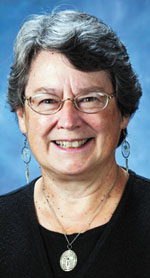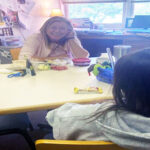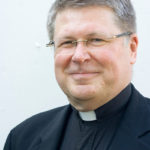By Corrine Winter
What messages will Pope Francis share with us during his visit to the United States this week? The agenda itself provides some clues. He will address Congress and the United Nations where, we can have little doubt, he will press his constant call to care for the poor and to alter the social structures that inhibit many from sharing the wealth that is concentrated among so few. He will also celebrate Mass for the World Meeting of Families after having met with organizers of that gathering. Like the messages cited above, strengthening family life has been a theme of Pope Francis’ papacy. He has issued numerous catechetical messages and preached many homilies on the importance of family life as foundational for the life of the church.

Pope Francis is developing a theme found in the documents of Vatican II, where the family is named “domestic church (LG 11).” The blessings for parents at the baptism of a child speak of the parents as the first teachers of their children and express the hope that they may also be the best of teachers.
Many of us may have experienced homes in which the faith was passed on by both word and deed. We may have grown up, for example with practices listed on the USCCB website as suggestions for building up the domestic church: with family prayer, with crucifixes in the home, with Mass attendance and celebrating the sacrament of reconciliation as established elements of the family schedule. Happily, a significant number of Catholic families are continuing or re-establishing ways of sharing faith at home.
But in my work with college-aged students, I also meet an increasing number of young people who approach a theology class with trepidation because they have never been to church. They may say something along the lines of, “We just never talked about religion or God at home.” While I hasten to assure such students that they can still do well in class as long as they keep up with assigned readings, I always feel a kind of sadness for them because of what they have missed.
I know that some members of my own generation thought that they would encourage personal religious choice by not “forcing” young people into religious practice as they felt perhaps they had been forced. In some cases, they wondered whether church attendance and other prayers were anything more than required practices, whether they affected the daily interactions and life choices of those who prayed.
What the bishops, Pope Francis, and families who believe in the importance of the domestic church are proposing is not force but witness. Parents who pray briefly and simply with children and who allow children to see them pray present a lived message that God has a place in daily life. Regular participation in Mass and appropriate conversations about the feasts and seasons of the Liturgical Year show the connection between family and the larger faith community, between the domestic and the local and universal church.
Furthermore, the domestic church, like the larger church is called to much more than a list of prayers and a display of religious artifacts. While we all experience temptation and failure as we attempt to live according to the beliefs and values we profess, we need to let others, especially within the family, know that we are trying to grow in both faith and virtue. We need to share our ideals even as we acknowledge that we are still on the way to reaching them.
Pope Francis and the bishops also encourage families to choose ways to reach out to others together. The love we have for one another within the family grows as together we share it with others.
As the church looks forward to the World Synod of Bishops on the Family, we may be tempted to focus on discussions about possible (or impossible) changes in some laws related to marriage. But the World Meeting of Families and many of the pope’s and bishops’ messages call us to attend more closely to every family’s calling to live a holy life whatever their situation might be.
(Editor’s note: Corinne Winters, a theology professor at St. Ambrose University in Davenport, recommends the book “Catholic Blessings & Household Prayers,” available through USCCB Publishing, Amazon.com and Barnes& Noblecom.)











